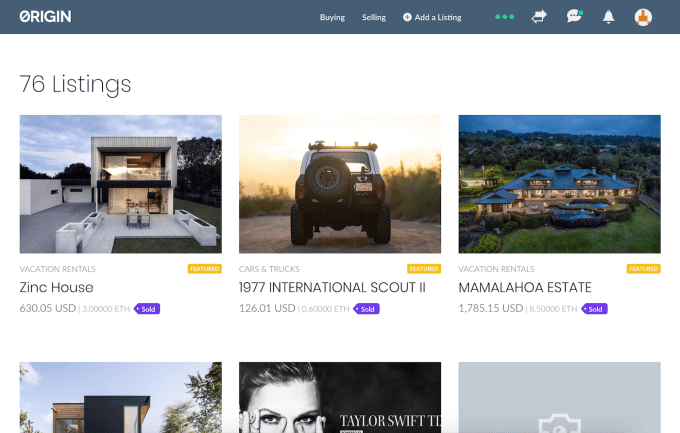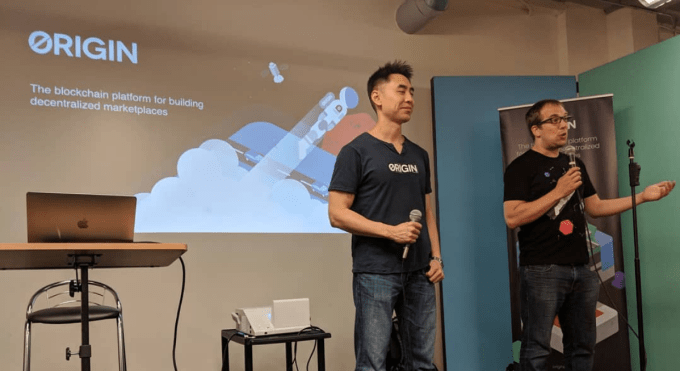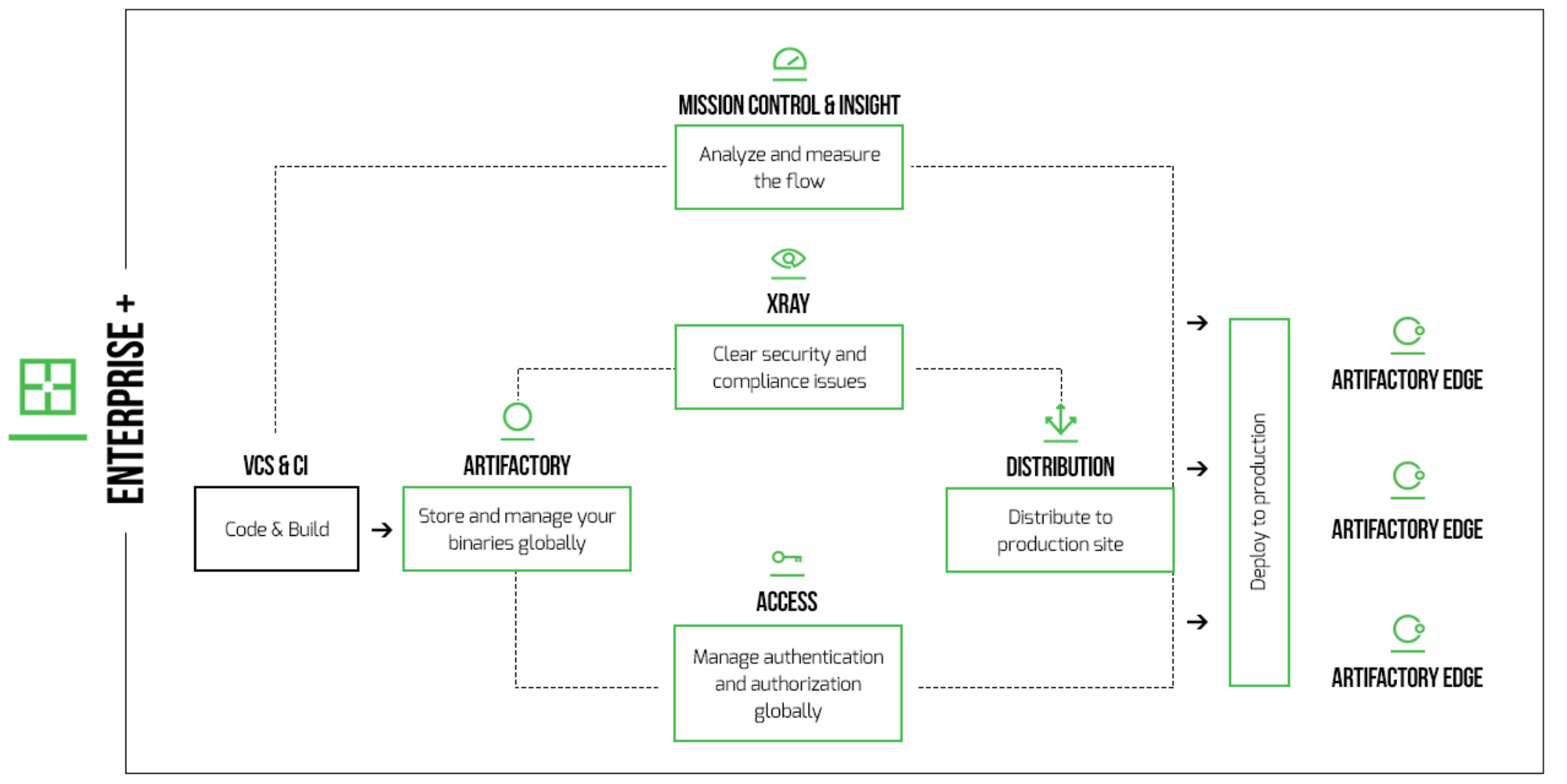Recent Funding
Auto Added by WPeMatico
Auto Added by WPeMatico
The sharing economy ends up sharing a ton of labor’s earnings with middlemen like Uber and Airbnb, and $38 million-funded Origin wants the next great two-sided marketplace to be decentralized on the blockchain so drivers and riders or hosts and guests can connect directly and avoid paying steep fees that can range up to 20 percent or higher. So today Origin launches its decentralized marketplace protocol on the ethereum mainnet that replaces a central business that connects users and vendors with a smart contract.
“Marketplaces don’t redistribute the profits they make to members. They accrue to founders and venture capitalists,” said Origin co-founder Matt Liu, who was the third product manager at YouTube. “Building these decentralized marketplaces, we want to make them peer-to-peer, not peer-to-corporate-monopoly-to-peer.” When people transact through Origin, it plans to issue them tokens that will let them participate in the governance of the protocol, and could incentivize them to get on these marketplaces early as well as convince others to use them.

Origin’s in-house marketplace DApp
Today’s mainnet beta sees Origin offering its own basic decentralized app that operates like a Craigslist on the blockchain. Users can create a profile, connect their ethereum wallet through services like MetaMask, browse product and service listings, message each other to arrange transactions through smart contracts with no extra fees, leave reviews and appeal disputes to Origin’s in-house arbitrators.
Eventually, with the Origin protocol, developers will be able to quickly build their own sub-marketplaces for specific services like dog walking, house cleaning, ridesharing and more. These developers can opt to charge fees, though Origin hopes the cost-savings from its blockchain platform will let them undercut non-blockchain services. And vendors can offer a commission to any marketplace that gets their listing matched/sold.
It might be years before the necessary infrastructure like login systems and simple wallets make it easy for developers and mainstream users to build and adopt DApps built on Origin. But it has plenty of runway thanks to $3 million in seed token sale funding from Pantera Capital, $6.6 million raised through a Coinlist token sale, plus $26.4 million in traditional venture funding from Pantera Capital, Foundation Capital, Garry Tan, Alexis Ohanian, Gil Penchina, Kamal Ravikant, Steve Jang and Randall Kaplan.
“Marketplaces are at the core of what makes the internet so valuable and useful and the Origin team has one of the most promising blockchain platforms for the new sharing economy — with currency baked in — this could be really disruptive (and one of the best utilizations of the ethereum blockchain),” says Ohanian, the Reddit and Initialized Capital co-founder.
Liu and co-founder Josh Fraser came up with the idea after trying to imagine the downstream effects of ethereum. Liu recalls thinking, “What if we could replace dozens of multi-million and multi-billion-dollar companies with open-source protocols that aren’t owned or controlled by anyone?”

Origin co-founders (from left): Matthew Liu and Josh Fraser
So why would marketplaces want to build on Origin instead of creating their own blockchain or traditional proprietary system? Fraser tells me smart contracts can save money, but that “these individual pieces are incredibly difficult to build,” so he sees Origin as “analogous to Stripe — able to abstract away all the friction of building on the blockchain.” Indeed, 40 marketplaces have already signed letters of intent to build on the protocol.
If Origin reaches critical mass, it could also benefit from the concept of shared network effect. Users only have to sign up once, and can then interact with any marketplace built on Origin. That means new marketplaces that builds on the protocol instantly has a registered user base.
Origin will face some stiff challenges, though. There’ll be a chicken-and-egg problem of getting the first marketplaces signed up before there are users on its self-sovereign identity platform, or getting those users aboard when there’s little for them to do. Liu admits that timing is the startup’s biggest threat. “We believe that decentralized marketplaces are inevitable, but a lot of smart people seem to think we’re too early and that we should be focused on building lower-level infrastructure instead,” the co-founder says. For us, we’d rather be too early than too late.”
 There’s also the trouble of leaving actors in a capitalist system to treat each other properly without a centralized authority. If an Uber driver treats you terribly, you can complain and get them kicked off the platform. Even with Origin’s review system, abusers of the system may be able to continue operating. It’s easy to imagine its arbitration service becoming completely overwhelmed with disputes. Luckily, Origin has made some strong hires to tackle these challenges, including Yu Pan, who it says was a PayPal co-founder, former head of Dropbox’s NYC engineering team Cuong Du, and Franck Chastagnol who previously led engineering teams at PayPal, YouTube, Google and Dropbox.
There’s also the trouble of leaving actors in a capitalist system to treat each other properly without a centralized authority. If an Uber driver treats you terribly, you can complain and get them kicked off the platform. Even with Origin’s review system, abusers of the system may be able to continue operating. It’s easy to imagine its arbitration service becoming completely overwhelmed with disputes. Luckily, Origin has made some strong hires to tackle these challenges, including Yu Pan, who it says was a PayPal co-founder, former head of Dropbox’s NYC engineering team Cuong Du, and Franck Chastagnol who previously led engineering teams at PayPal, YouTube, Google and Dropbox.
Origin’s success will all come down to usability. Your average Uber driver or Airbnb host is no blockchain expert. They vend through those apps because it’s easy. Those centralized organizations are also highly incentivized to fulfill transactions quickly and smoothly in ways prohibited by eliminating fees. Origin will have to effectively make the blockchain aspects of its service disappear so all users and vendors know is that they’re paying less or earning more.
Powered by WPeMatico
CAVU Venture Partners has led the $20 million Series B for Once Upon a Farm, which sells organic, cold-pressed baby food in 8,500 grocery stores in the U.S.
The Berkeley-based startup was originally founded in 2015 by serial entrepreneurs Cassandra Curtis and Ari Raz. Today, it lists actress Jennifer Garner and former General Mills president John Foraker as co-founders, too.
Both Garner and Foraker — who was the chief executive officer of the popular organic mac & cheese brand Annie’s Homegrown for more than a decade — joined the company in September 2017. Foraker had been an angel investor in Once Upon a Farm and, after conversations with Garner, decided to accept the role of CEO. Garner, widely known for her roles in Alias, 13 Going on 30 and the upcoming HBO original series Camping, was already somewhat of a Once Upon a Farm evangelist when she signed on as chief brand officer a little over a year ago.
“I am proud of the innovative business that we have built,” Garner said in a statement. “It is incredibly exciting to see so many families embracing our products. This latest round of funding allows us to continue to help busy parents give their children the most nutritious foods possible and make life a little bit easier for families across the country.”
Foraker told TechCrunch that since he and Garner joined, the business has grown 10x. Last fall, the company’s products were for sale in 300 stores; today, as mentioned, they are available in more than 8,000.
“Because she has global celebrity, the power of that, she can really help us get the message out and help lots of moms and dads find [Once Upon a Farm],” Foraker said.
Once Upon a Farm sells smoothies and applesauce for kids up to age 12 directly to consumers through its online marketplace and in stores. Pouches of its signature baby food, smoothies and applesauce are $2.99 each.
As part of the deal, CAVU’s co-founder and managing partner Brett Thomas, along with CAVU investor Jared Jacobs, will join the company’s board. S2G Ventures and Beechwood Capital also participated in the round for the startup, which raised a $4 million Series A in June 2017.
The company plans to use the funds to expand its direct to consumer business, partner with more U.S. grocers and build out a wider assortment of baby products.
“You can buy fresh pet food now in almost 20,000 stores in the U.S.,” Foraker said. “We think fresh baby food has a long way to go.”
Powered by WPeMatico
Netlify wants to revolutionize the way developers build websites, abstracting away the web server and breaking web sites into microservices, making the process more like building a mobile application than a traditional website. Today, the company announced a $30M Series B investment to help continue to build on that vision.
Kleiner Perkins led the round. Andreessen Horowitz and the founders of Slack (Stewart Butterfield), Yelp (Jeremy Stoppelman) and Figma (Dylan Field) all participated. Today’s investment brings the total raised to over $44 million, according to Crunchbase data.
Chris Bach, co-founder and president and Matt Biilmann, co-founder and CEO see the change they are trying to make as part of the larger shift to an API economy. They want to take the same ease of development APIs have given programmers in a mobile context and bring that to web development.
As I wrote earlier this year when they announced support for AWS Lambda, they want to reduce the complexity around web development:
“Netlify has abstracted away the concept of a web server, which it says is slow to deploy and hard to secure and scale. By shifting from a monolithic website to a static front end with back-end microservices, it believes it can solve security and scaling issues and deliver the site much faster.”
The founders have a grand vision, “We are basically out to replace all web servers with a with a global application delivery network,” Bach explained.
Mamoon Hamid, general partner at investor Kleiner Perkins says that while the website backend has evolved over recent years, the front end has remained static, and that’s what Netlify is addressing with their microservices-based approach to web development. “Netlify smack dab hits our view of where we need to go for the web to flourish,” Hamid told TechCrunch.
He believes the last shift of this magnitude in web development at the presentation layer was the advent of the CMS 15 years ago, and we are starting to see developers attracted to the Netlify approach in a big way. “We really believe that with this 300,000 strong developer force that’s already behind Netlify that they’re showing early signs of tapping into what could be the platform from which a significant portion of the web content is served from [in the future],” Hamid said.
Netlify is working to increase the number of websites running on their approach in the coming years and see this as a mission to change the web. “For us, it’s very important to keep being a place where developers want to go and very easily can get something up and running. And then you can scale from there,” Bach said.
The company wants to build out a more organized sales and marketing team to sell the Netlify approach to larger organizations, while continuing to build out the product and developer outreach. All of this takes money and that’s why they went for such a large round today.
Powered by WPeMatico
Data is valuable — if you know how to access it and reap the insights from it. That’s where Machinify comes in. The artificial intelligence company just raised a $10 million Series A round led by Battery Ventures with participation from GV and Matrix Partners.
“Our core notion is that today, enterprises are collecting a ton of data,” Machinify founder and CEO Prasanna Ganesan told TechCrunch. “But if you look at how many of them are successful in turning it into smarter decision-making to drive efficiency, very few companies are succeeding.”
With Machinify, enterprise customers feed the system raw data, specify what they’re trying to optimize for — whether that be revenue or some other goal — and then the machine figures out what to do from there. Based on past decisions, the machine can figure out the right thing to do, Ganesan said.
A good example of how companies use Machinify is in the healthcare space, where businesses are using the tool to increase the accuracy and speed with which they process claims. By doing so, these companies have been able to increase revenue and reduce costs.
“Machinify is laser-focused on the critical operational issues created by the deployment of what we often call Software 2.0 within enterprises,” GV general partner Adam Ghoborah said in a statement. “Software 2.0 is software that is not written by humans like traditional software but is dynamically driven by AI models and large enterprise datasets. Software 2.0 requires a completely different approach, and we believe that the Machinify platform holds the key to unlocking its value.”
Powered by WPeMatico
A couple of years ago YC-backed RankScience, which offers AI-enhanced SEO split-testing, put a few SEO experts’ noses out of joint when the fledgling startup brashly talked about replacing human expertise with automation.
Two years on its pitch has mellowed, with the team saying their self-service platform is “augmenting human SEO ability rather than replacing them”.
The startup has also — finally — closed a seed round, announcing $1.8M led by Initialized Capital, along with Adam D’Angelo, Michael Seibel, BoxGroup, Liquid2 Ventures, FundersClub, and Jenny 8 Lee participating.
The new roster of investors join a list of prior backers that includes Y Combinator, 500 Startups, Christina Cacioppo, and Jack Groetzinger.
So what took them so long? Founder Ryan Bednar tells TechCrunch they wanted to take their time with the seed, rather than raise more money than they needed — a position that was possible thanks to already being profitable at YC Demo Day.
“I admit that this is unusual,” he says of the slow seed, though he also says they did raise a “small amount” after demo day, before filling out the rest this month.
“I saw many YC batchmates raising massive rounds pre product-market-fit, which can end up being a mistake,” he adds. “We probably could have raised a few million at Demo Day but ultimately didn’t feel we were ready for it. I didn’t know what I would spend the money on, and we were growing without it, so we chose not to. I wanted to raise capital when I felt we were ready to use it for growth, and now’s that time.”
Bednar also says he is “selective” when it comes to investors — and “specifically” wanted to work with Initialized, saying he’s “known Garry and Alexis personally for years, and trust that they would support us in building a long-term scalable business”.
Commenting on the funding to TechCrunch, Initialized Capital’s Alexis Ohanian tells us: “Even though so many businesses depend on traffic from search, it’s a challenge for them to be data-driven about SEO. RankScience makes it easy to test changes to your website that can lift search traffic. They also automate a growing number of technical SEO tasks, which otherwise would take engineers away from building product and infrastructure, which is really exciting.”
RankScience plans to use the fresh funding to hire more AI and machine learning engineers, with headcount growth targeted at its SF office.
While the founders have stepped back from pronouncing ‘the death of the SEO expert’, they are still touting the power of automation AI for SEO — noting how, after crawling a customer’s site/s, the software automatically proposes “SEO enhancements and experiments” to customers — for “one-click [human] approval”.
It also includes what Bednar bills as a “self-driving car mode” — where the tech will deploy the touted “enhancements and experiments” without customer approval. But he concedes it’s not for all RankScience users.
“For about half of our customers, we’re their only SEO vendor so we automate SEO services 100% for them, and for the other half, our software augments human SEO ability, either from in-house marketers or agencies,” he says, explaining how the team has evolved their thinking on automation vs human agency and expertise.
“When we launched we didn’t think hard enough about what sorts of controls SEO managers at larger websites would want, and we tried to automate everything without giving marketers enough control. This was a mistake and we’ve worked hard on correcting it.
“This should have been obvious but it turns out that SEO managers are highly selective about what sorts of HTML changes our software might make to their webpages. So we’ve spent the past year building tools to give SEO marketers complete control over everything our software does, and also advanced editors and tools so they can create their own SEO enhancements and run SEO split tests through the platform.”
For those who make use of RankScience’s ‘Self-Driving Car Mode’ the software is replacing SEO staff “completely”, but he adds: “This works especially well for startups and medium size businesses. But SEO is such a multifaceted problem, we want to give larger companies with marketing teams complete control over our platform, and so we work with both types of customers.”
As well as (finally) closing out its seed round now, RankScience is also launching a new self-service platform for startups and SMEs — touting greater controls.

On the customer front, Bednar says they have “hundreds” of sites on the platform now — and are serving “hundreds of millions of page views per month”. Cumulatively he says they’ve deployed “millions” of SEO split tests at this point.
“Our customers run the gamut from startups just getting started with SEO to publicly-traded companies,” he continues. “Our best industries are SaaS, ecommerce, marketplaces, healthcare, publishing, and location-based sites.
“We’ve recently been working with more consumer goods brands, and we’ve also launched a partnership program so that we can work with SEO and Digital Marketing Agencies and independent consultants.”
He says the vast majority of RankScience users are based in the US at this stage but adds that Europe is a “growing market”.
In terms of competition, Bednar name-checks the likes of Moz, Conductor (acquired this year by WeWork), BloomReach and BrightEdge — so it is swimming in a pool with some very big fish.
“Most of these products are more akin to advanced SEO analytics suites, and we differ in that RankScience is 100% focused on data-driven SEO automation,” he says, fleshing out the differences and RankScience’s edge, as he sees it. “Our software doesn’t just tell you what changes to make to your site to increase search traffic, it actually makes the changes for you. (Now with more controls!)”
Powered by WPeMatico
Consumer messaging apps like WhatsApp are not only insanely popular for chatting with friends but have pushed deep into the workplace too, thanks to the speed and convenience they offer. They have even crept into hospitals, as time-strapped doctors reach for a quick and easy way to collaborate over patient cases on the ward.
Yet WhatsApp is not specifically designed with the safe sharing of highly sensitive medical information in mind. This is where Dutch startup Siilo has been carving a niche for itself for the past 2.5 years — via a free-at-the-point-of-use encrypted messaging app that’s intended for medical professions to securely collaborate on patient care, such as via in-app discussion groups and being able to securely store and share patient notes.
A business goal that could be buoyed by tighter EU regulations around handling personal data, say if hospital managers decide they need to address compliance risks around staff use of consumer messaging apps.

The app’s WhatsApp-style messaging interface will be instantly familiar to any smartphone user. But Siilo bakes in additional features for its target healthcare professional users, such as keeping photos, videos and files sent via the app siloed in an encrypted vault that’s entirely separate from any personal media also stored on the device.
Messages sent via Siilo are also automatically deleted after 30 days unless the user specifies a particular message should be retained. And the app does not make automated back-ups of users’ conversations.
Other doctor-friendly features include the ability to blur images (for patient privacy purposes); augment images with arrows for emphasis; and export threaded conversations to electronic health records.
There’s also mandatory security for accessing the app — with a requirement for either a PIN-code, fingerprint or facial recognition biometric to be used. While a remote wipe functionality to nix any locally stored data is baked into Siilo in the event of a device being lost or stolen.

Like WhatsApp, Siilo also uses end-to-end encryption — though in its case it says this is based on the opensource NaCl library
It also specifies that user messaging data is stored encrypted on European ISO-27001 certified servers — and deleted “as soon as we can”.
It also says it’s “possible” for its encryption code to be open to review on request.
Another addition is a user vetting layer to manually verify the medical professional users of its app are who they say they are.
Siilo says every user gets vetted. Though not prior to being able to use the messaging functions. But users that have passed verification unlock greater functionality — such as being able to search among other (verified) users to find peers or specialists to expand their professional network. Siilo says verification status is displayed on profiles.
“At Siilo, we coin this phenomenon ‘network medicine’, which is in contrast to the current old-fashioned, siloed medicine,” says CEO and co-founder Joost Bruggeman in a statement. “The goal is to improve patient care overall, and patients have a network of doctors providing input into their treatment.”
While Bruggeman brings the all-important medical background to the startup, another co-founder, Onno Bakker, has been in the mobile messaging game for a long time — having been one of the entrepreneurs behind the veteran web and mobile messaging platform, eBuddy.
A third co-founder, CFO Arvind Rao, tells us Siilo transplanted eBuddy’s messaging dev team — couching this ported in-house expertise as an advantage over some of the smaller rivals also chasing the healthcare messaging opportunity.
It is also of course having to compete technically with the very well-resourced and smoothly operating WhatsApp behemoth.
“Our main competitor is always WhatsApp,” Rao tells TechCrunch. “Obviously there are also other players trying to move in this space. TigerText is the largest in the US. In the UK we come across local players like Hospify and Forward.
“A major difference we have very experienced in-house dev team… The experience of this team has helped to build a messenger that really can compete in usability with WhatsApp that is reflected in our rapid adoption and usage numbers.”
“Having worked in the trenches as a surgery resident, I’ve experienced the challenges that healthcare professionals face firsthand,” adds Bruggeman. “With Siilo, we’re connecting all healthcare professionals to make them more efficient, enable them to share patient information securely and continue learning and share their knowledge. The directory of vetted healthcare professionals helps ensure they’re successful teamplayers within a wider healthcare network that takes care of the same patient.”
Siilo launched its app in May 2016 and has since grown to ~100,000 users, with more than 7.5 million messages currently being processed monthly and 6,000+ clinical chat groups active monthly.
“We haven’t come across any other secure messenger for healthcare in Europe with these figures in the App Store/Google Play rankings and therefore believe we are the largest in Europe,” adds Rao. “We have multiple large institutions across Western-Europe where doctors are using Siilo.”
On the security front, as well flagging the ISO 27001 certification the company has gained, he notes that it obtained “the highest NHS IG Toolkit level 3” — aka the now replaced system for organizations to self-assess their compliance with the UK’s National Health Service’s information governance processes, claiming “we haven’t seen [that] with any other messaging company”.
Siilo’s toolkit assessment was finalized at the end of Febuary 2018, and is valid for a year — so will be up for re-assessment under the replacement system (which was introduced this April) in Q1 2019. (Rao confirms they will be doing this “new (re-)assessment” at the end of the year.)
As well as being in active use in European hospitals such as St. George’s Hospital, London, and Charité Berlin, Germany, Siilo says its app has had some organic adoption by medical pros further afield — including among smaller home healthcare teams in California, and “entire transplantation teams” from Astana, Kazakhstan.
It also cites British Medical Journal research that found that of the 98.9% of U.K. hospital clinicians who now have smartphones, around a third are using consumer messaging apps in the clinical workplace. Persuading those healthcare workers to ditch WhatsApp at work is Siilo’s mission and challenge.
The team has just announced a €4.5 million (~$5.1M) seed to help it get onto the radar of more doctors. The round is led by EQT Ventures, with participation from existing investors. It says it will be using the funding to scale up its user base across Europe, with a particular focus on the UK and Germany.
Commenting on the funding in a statement, EQT Ventures’ Ashley Lundström, a venture lead and investment advisor at the VC firm, said: “The team was impressed with Siilo’s vision of creating a secure global network of healthcare professionals and the organic traction it has already achieved thanks to the team’s focus on building a product that’s easy to use. The healthcare industry has long been stuck using jurassic technologies and Siilo’s realtime messaging app can significantly improve efficiency
and patient care without putting patients’ data at risk.”
While the messaging app itself is free for healthcare professions to use, Siilo also offers a subscription service to monetize the freemium product.
This service, called Siilo Connect offers organisations and professional associations what it bills as “extensive management, administration, networking and software integration tools”, or just data regulation compliance services if they want the basic flavor of the paid tier.
Powered by WPeMatico
You may recall Rylo from this time last year, when the imaging startup launched a creative take on the 360 camera. The company’s been fairly quiet in the six months since it launched some new software tricks, but a new round of funding should help the company take some key steps toward spreading the gospel.
This week, Rylo announced that it has secured a $20 million Series B, led by Icon Ventures. That brings its total up to $35 million, with help from Accel Partners and Sequoia Capital. Plans for the funding are pretty much what you’d expect.
“Securing Series B funding from this excellent group of investors will allow us to maximize our potential for growth and earn significantly more market share,” CEO Alex Karpenko said in a release tied to the news. “We have come a long way since our launch one year ago, and I’m excited to continue to drive Rylo’s growth through investments in marketing, sales and retail partnerships in the coming year.”
Rylo’s camera represents an interesting piece of tech that utilizes 360 videos to create some unorthodox camera tricks, like stabilizing images, following subjects and creating a number of interesting effects. The product also has solid distribution with more than 500 retail locations in the U.S., including Best Buy.
Marketing, however, is going to be key for the success of the $499 camera, whose initial appeal is not as immediately apparent as the likes of GoPro.
Powered by WPeMatico
One can only imagine what it was like to work at Uber in the years leading up to Susan Fowler’s infamous blog post. Many of the company’s leaders were said to be overly competitive, sexist and inappropriate — “brilliant jerks,” as Arianna Huffington once said, — and its over-arching “move fast and break things” mentality hardly left room for employees to take a step back and reflect on how the company’s culture was impacting their mental health.
Andrew Chapin joined Uber in 2011 as one of its first hires in New York. He worked his way up to head of vehicle solutions and established Uber’s vehicle finance program, which helps drivers obtain and pay off car leases. He says the struggles within the company gave him severe anxiety, something he was all too familiar with from his stint as a commodities trader at Goldman Sachs.
“There were days when I was walking through lower Manhattan and thinking if I got hit by a car and was in the hospital for a week, it’d be better than going to work,” Chapin told TechCrunch.
At both Goldman and Uber, Chapin would go through rough patches but resisted therapy, in part because of the outlandish costs but mostly because of the hassle. Toward the end of his five-year Uber tenure, he realized the dire need for accessible and flexible tech-enabled tools to help workers endure stressful times, as well as the need to destigmatize the mental health issues prevalent within the tech industry and beyond.
In late 2016, he left Uber to build his own startup. Two years later, he’s ready to share what he’s been working on. Basis, an app meant to help people cope with anxiety, depression and other mental health issues through guided conversations via chat or video, is emerging from stealth today with a $3.75 million investment led by Bedrock. Wave Capital and Lightspeed Venture Partners have also participated in the round.
“Looking back at the Goldman experience of just kind of wallowing in this unpleasant situation, [Basis] would have been an outlet to talk through things and feel lighter,” Chapin said. “At the time, I bottled it up. In retrospect, if I had something to work me through the emotions I was dealing with, it would have been really helpful.”
In the app, users can schedule 45-minute phone calls with unlicensed providers for $35. Because Basis works with paraprofessionals — people trained in research-backed approaches but who don’t have the same certifications as a counseling or clinical psychologist — it’s a much cheaper alternative to paying for a therapist. The startup does not give diagnoses or write prescriptions.
Chapin built the app with co-founder and chief science officer Lindsay Trent, a former research psychologist at Stanford who’d grown tired of watching trained psychologists charge outlandish fees and was hungry for an innovative solution to today’s mental health crises.
“I saw a real gap between what we knew was effective and what people actually received,” Trent told TechCrunch. “Clinicians that are charging $300 a session are not providing optimal care. It’s very frustrating for me.”
Basis provides six pathways: Work, Social, School, Finances, Relationships and Parenting. Within each, users can get same-day access to specialists who they can opt to see on a regular basis or just once.
The idea is that Basis fits into your life much like a SoulCycle class or a call with your best friend — on your terms.
Powered by WPeMatico
JFrog wants to change the way we deal with software updates. Instead of large numbered updates you have to manually download, it sees a future of continuous delivery where software is delivered as binaries and updated in the background. Investors must like that vision very much because they showered the company with a $165 million Series D investment today, which it says pushes its valuation past the billion-dollar mark.
The round was led by Insight Venture Partners, and as part of the deal Insight’s co-founder and managing director, Jeff Horing will be joining the JFrog board. Other investors joining the round included new investors and Silicon Valley Funds, Spark Capital and Geodesic Capital, as well as existing investors Battery Ventures, Sapphire Ventures, Scale Venture Partners, Dell Technologies Capital and Vintage Investment Partners. Today’s investment pushes the total invested to-date to over $226 million.
What the company has done to justify this kind of investment is offer a series of products that enable customers to deliver code in the form of binaries. That in turn allows them to deliver updates on a regular basis in the background without disturbing the user experience. In a world of continuous delivery, this approach is essential. You couldn’t deliver multiple updates a day if you had to take down your service every time you did it.
The JFrog platform is actually made up of multiple products, but the main one is JFrog Artifactory where companies can add the latest binaries (updates) and deliver them to customers in the background. It’s not unlike, GitHub, but whereas GitHub is a repository for downloading software and updates, the Artifactory is a place to deliver these updates automatically without user involvement. It also handles other DevOps functions like security, access control and distribution.

JFrog platform. Diagram: JFrog
CEO and co-founder Shlomi Ben Haim was happy to reveal that the company’s valuation had entered unicorn territory, but he wasn’t willing to share an exact number. “I don’t want to get into details, but we exceeded the billion dollar valuation. We are north of $1 billion already and we are building the company to generate the revenue to justify it,” he told TechCrunch.
He wasn’t discussing specific revenue numbers, but reports the company has a goal of a billion dollars in revenue by 2025, and he says they are working toward that. He did say they have had 500 percent revenue growth since the $50 million round in 2016, and that they tripled the number of employees to 400, while doubling the number of products they offer. They currently have 4500 customers including 70 percent of the Fortune 100.
So fair to say things are going well for the company. Ben Haim says the ultimate goal for the company is to deliver software in the background for scenarios like your operating system or your Tesla. Instead of shutting down your car or computer for the next software update, it will just happen over the air in the background. We are obviously a ways from fulfilling that vision, but investors are clearly betting on that potential.
Powered by WPeMatico
People procrastinate about buying insurance because it’s such a boring and complicated chore to compare policies. But Cover combines plans from 45 insurance companies into a single marketplace so it’s easy to find the best one for your car, home, rental, business, personal property, pets, jewelry and more. Now Cover is building powerful onboarding tricks like a driving school that earns you lower car insurance rates, and a way for Shopify merchants to sell warranties for their items.
The potential to use tech to run circles around the old insurance brokers has attracted a new $16 million Series B for Cover led by Tribe Capital’s Arjun Sethi, who led the Series A and sits on the startup’s board. The round was joined by Y Combinator, Social Capital, Exor and Samsung, and brings the company to a total of $27.1 million in funding.

“Insurance isn’t very different from being a white-collar bookie, where the house’s rake is too high and the dollars at stake are in the hundreds of billions in the U.S. alone,” says co-founder and CEO Karn Saroya. “This, all to the detriment of regular people, who view insurance as a tax. We’re here to change that perception.”
Saroya and his co-founders have deep ties. He went to high school with Anand Dhillon, is engaged to Natalie Gray and hired Ben Aneesh at the team’s previous startup, a high-end fashion marketplace called StyleKick that was eventually acqui-hired by Shopify. “We were tossing around ideas for what we wanted to do after StyleKick/Shopify, running hackathons on weekends. We built a couple different apps, but Cover — the MVP, where we just asked potential customers to take pictures of things they wanted to insure, surprised us” says Saroya. “Our customers sent us walkthroughs of their homes, pictures of their dogs and videos of themselves washing their cars. When you come across behavior that violates your expectations in consumers, that’s usually when you double-down.”

Cover co-founder and CEO Karn Saroya
So they built Cover, where you don’t have to cobble together an endless set of insurance websites or wait on hold. You download the app, pick your item, list how much you paid and where, provide some photos or video of its condition using its TensorFlow-equipped camera and Cover will check across its insurance partners and find you the best quote instantly. You can easily see what is and isn’t covered, learn how to make claims, and text with an agent if you have questions. For example, I was quickly quoted $5 per month to insure my new iPhone against damage but not loss or theft.
Cover earns between 10 to 35 percent per dollar of premium you pay. Its annualized premium already exceeds $8.5 million and is growing 30 percent per month. Thanks to its low-churn business model, easy cross-promotion of products, low training requirements for customers and no need to constantly update its existing subscriptions, Cover starts to look like a very efficient software-as-a-service business.
The big question remains whether Cover can consistently find the best rates for customers so they don’t second guess its quotes and search somewhere else. It will have to outcompete multi-insurance providers, like State Farm and Geico, as well as startups like MetroMile tackling specific insurance verticals with mobile apps. To really earn the big profits, Cover is building out its own in-house insurance plans. But that will put it under constant threat of insuring the wrong risks and ending up paying out too much.

“We built Cover because we saw an opportunity to build elegant products that could deliver on pricing and customer experience in a way that no incumbent insurance entity can,” Saroya concludes. By bringing the service to mobile and making it a seamless part of owning something, Cover could ensure you’re insured, even if insurance is the last thing you want to think about.
Powered by WPeMatico